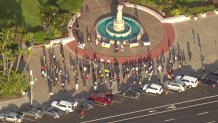The Trump administration's bid to end legal protections for Deferred Action for Childhood Arrivals (DACA) recipients was denied by the United States Supreme Court in a striking move on Thursday sending waves of elation among the hundreds of thousands of young immigrants it affected, including those in San Diego.
But the 5-4 outcome, in which Chief Justice John Roberts was the swing vote between the four liberal justices and four conservative justices, was made because the administration did not properly pursue an end to the program that provides deportation protection for those who arrived in the country illegally as children.
The decision came as a shock to some of the more than 10,500 DACA recipients living, working, and studying in San Diego, including Irving Hernandez, who came to the U.S. at 6 years old and is a San Diego State student studying to be an Aerospace engineer.
"We’ve been anticipating the worst. It’s been months of sleepless nights, waiting for a decision," Hernandez said. "It was such a relief -- truly a relief to find out there was justice today for us DACA recipients."
While there are celebrations to be had among the young immigrant community, Hernandez noted that it is not the end.
Roberts, who wrote the opinion for the court, said the administration's end to DACA in 2017 violated the Administrative Procedure Act, but noted the Department of Homeland Security (DHS) can try again using proper procedure.
Local
For now, DACA recipients retain their protection from deportation and their authorization to work in the U.S.
"It’s very important for us to maybe celebrate today. Today is a great day to celebrate," Hernandez said. "But tomorrow we must continue planning, acting because we know this administration will continue to act against DACA from the very beginning they created this crisis."
The justices that wrote the dissenting opinion argued that the 8-year-old program is illegal and that courts have no role to play in reviewing the decision to end DACA.
The Deferred Action for Childhood Arrivals program was created under the Obama Administration to give certain protections to immigrants brought illegally to the United States as children and teens, some of which have no memory of a home other than the United States. It was meant to be a stepping stone on the way to a more comprehensive immigration bill in 2012.
DACA recipients must meet several requirements, including having no criminal record. They also must have been 30 or younger when the program was launched and brought to the U.S. before age 16.
The application cost is nearly $500, and permits must be renewed every two years. DACA does not give beneficiaries legal U.S. residency; they are simply given a reprieve from deportation while being allowed to legally work.
The move was celebrated by Democratic leaders across the state -- where more than 184,000 DACA recipients reside -- as well as in San Diego.
Local DACA recipient David, 29, who works at UC San Diego Health as a critical care partner in the intensive care unit and came to the U.S. at the age of 5, says this is a temporary victory.
"Although this is not a permanent solution, it does diminish the fear of being deported by the termination of the program. This ruling will allow me to continue working and providing for my community as a health care worker," he said.
According to the Center for American Progress, 56,900 DACA recipients are working in occupations at the forefront of the COVID-19 response in California which includes health care, education, and food-related jobs.
San Diego County Supervisor Nathan Fletcher called the ruling a win for America.
"Dreamers call this country home because America is their home. DACA has allowed thousands of young immigrants to contribute back to their communities. Dreamers have stepped up during the coronavirus pandemic as doctors, nurses, and essential frontline workers. Dreamers have always contributed greatly to our nation, to our communities, and represent what truly makes America great," Fletcher said in a statement noting that the fight continues by pushing the federal government for a pathway to citizenship.
San Diego Mayor, Kein Faulconer said it's time for Congress to put DACA protections into law.
A rally for "Justice Everywhere" was held at the County Administration Building Wednesday afternoon to celebrate the ruling.
"We're stoked, this has given our movement new energy. We're definitely going to use it, not only to celebrate but use it as a push for comprehensive immigration reform, for something more," said Dulce Garcia, the emcee for the rally, a Dreamer, and one of the named plaintiffs in the lawsuit against the Trump administration filed after the termination of DACA. "This is a moment to enjoy, but this is not the end of it."




